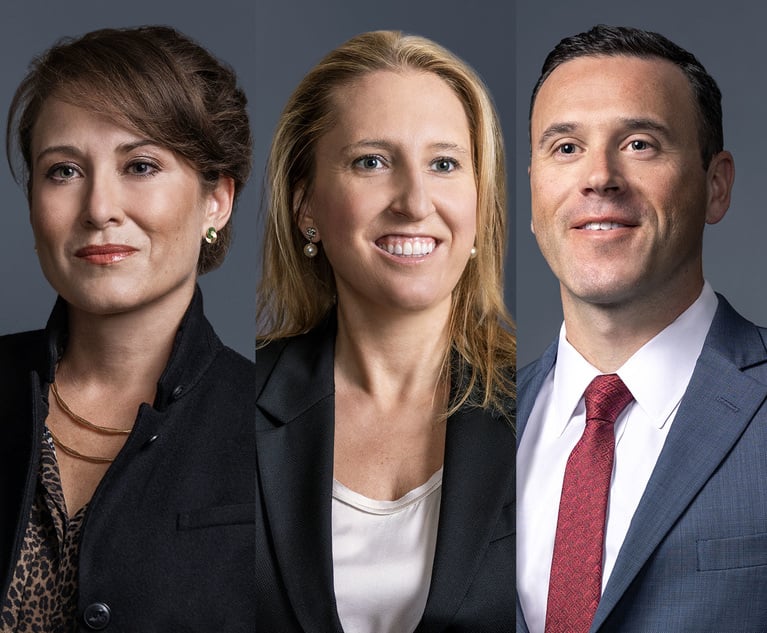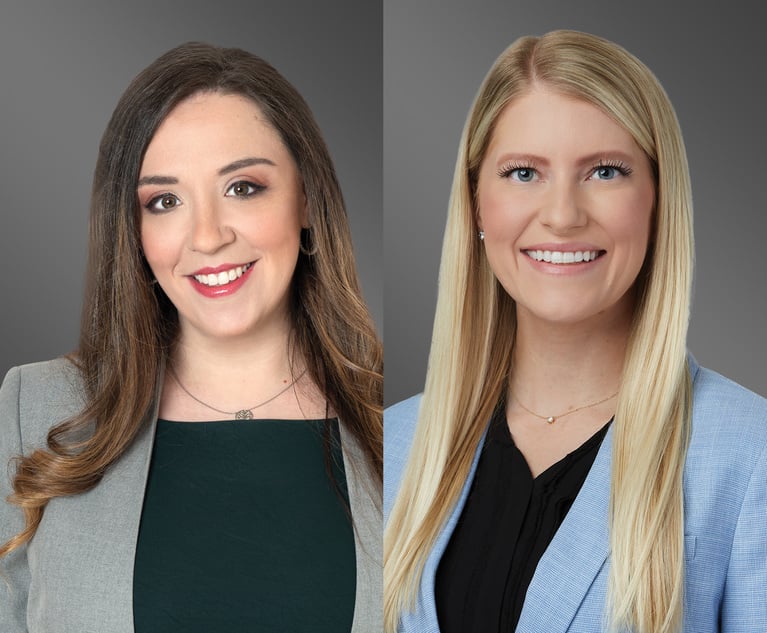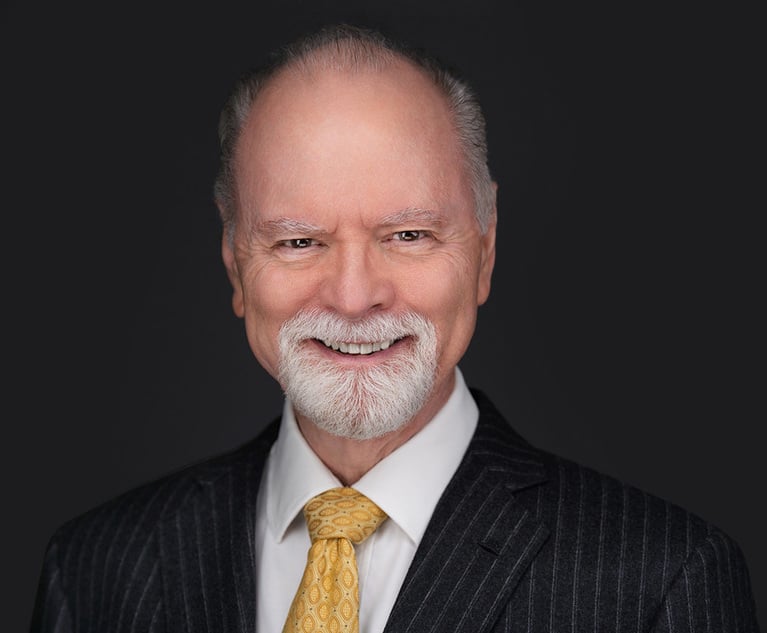On Appeals: Physical Laws v. Appellate Rules
For every claim or defense there is usually some type of legal rejoinder. But it's important to keep an eye on the rules of appellate procedure if you want to keep the momentum going in your favor.
March 10, 2020 at 10:05 PM
6 minute read
 Charles Kagay, California Appellate Law Group. (Courtesy photo)
Charles Kagay, California Appellate Law Group. (Courtesy photo)
Isaac Newton instructed that for every action there is an opposite reaction. Sometimes the law can illustrate this principle because for every claim or defense there is usually some type of legal rejoinder. But it's important to keep an eye on the rules of appellate procedure if you want to keep the momentum going. As an illustration, consider the recent Fourth District, Division One Court of Appeal decision Kinsella v. Kinsella.
Tamara and Kevin Kinsella lived together beginning in 1989, at which time Kevin was quite wealthy. They married in 1997, and Tamara filed for divorce in 2012. What followed was a seemingly endless series of tit-for-tat legal exchanges.
Tamara was apparently displeased that Kevin was able to protect his separate property in the divorce action, so she reacted by filing against Kevin what is commonly known as a Marvin action. In her suit, Tamara alleged that Kevin had made a binding pre-marriage promise to support her for the rest of her life and to give her half of what he owned.
In 2015, in the course of the Marvin action, Kevin fought back with a motion for summary judgment, contending he had not made the alleged promise. Tamara rebuffed this effort by declaring that Kevin had made such a promise. This raised an issue of fact that compelled the court to deny the motion. However, Tamara's Marvin action eventually ran out of steam, and she dismissed it without prejudice in 2017.
But Kevin could not resist the temptation to react, and so he sued Tamara in 2018, charging her with malicious prosecution in instituting the Marvin action. Tamara quickly countered by filing an anti-SLAPP motion against Kevin. The anti-SLAPP (strategic lawsuit against public participation) statute provides for the speedy dispatch of non-meritorious suits that have been brought to stifle an exercise of free speech or petition rights. Malicious prosecution suits are amenable to such motions, so the burden shifted to Kevin to demonstrate a probability of success on his malicious prosecution claim.
Tamara argued that Kevin could not establish a probability of success because a malicious prosecution plaintiff must prove that the plaintiff in the underlying action sued without probable cause. This Kevin could not do, she maintained, because of the "interim adverse judgment rule."
This rule holds that if the plaintiff in the underlying suit is victorious — even just in securing the partial victory of defeating summary judgment, as Tamara had done — then she did not lack probable cause and a cause of action for malicious prosecution cannot lie.
Not so fast, Kevin retorted. He one-upped the "interim adverse judgment rule" by invoking the "fraud exception to the interim adverse judgment rule." Under this exception, a victory in the underlying suit procured by fraud will not defeat the malicious prosecution claim. And the fraud exception will arise if summary judgment was obtained through presenting false statements to the court. So Kevin asserted, through a declaration, that Tamara had made false representations about his supposed promises when she opposed his summary judgment motion in the Marvin action.
This was not enough to defeat Tamara's anti-SLAPP motion in the trial court, which held that Kevin's declaration that Tamara had made false statements in opposing his summary judgment motion was not sufficient to establish the fraud exception to the interim adverse judgment rule. The court granted Tamara's motion, entered judgment in her favor, and awarded her attorney fees.
Naturally, Kevin's reaction was to file an appeal. At this point, though, the ceaseless back and forth between Tamara and Kevin ran up against the hard wall of appellate procedure. Appellate courts are not prone to allowing parties to continue to take their shots against one another unless they pay close attention to the appellate rules and limitations.
For one thing, it's just as important to make evidentiary objections in pretrial motion proceedings as it is at trial. Many of Tamara's arguments on appeal went to the admissibility of Kevin's evidence, but these all fell flat because she had not raised a single evidentiary objection in the trial court. As the Court of Appeal was quick to point out, "incompetent hearsay admitted without objection is sufficient to sustain a finding or judgment."
Equally important to success on appeal is getting into the record all the evidence you might need to win. Tamara argued that, even if her declaration in opposition to the summary judgment motion in the Marvin action had been false, as Kevin claimed, she had presented more than enough additional evidence to defeat the motion. That might be so, the Court of Appeal observed, but it couldn't reverse on that basis because Tamara did not present a sufficient record of the Marvin summary judgment proceedings to determine any alternative bases on which the motion could have been denied.
With little before it to justify the grant of Tamara's anti-SLAPP motion, the Court of Appeal had no difficulty reversing, noting that a plaintiff opposing an anti-SLAPP motion need only establish that his claim has "minimal merit." But the court also took the occasion to use appellate procedure to throw cold water on the part of Kevin's appeal that attacked the award of attorney's fees to Tamara. The court noted that the record did not include the fee order and that his briefing did not address the award of fees. Because "Kevin has not provided a record, legal authority, or argument from which this court can make a ruling regarding any postjudgment award of attorney fees or costs," the court declined even to express a view on this part of his appeal.
With the couple back in the trial court, they'll undoubtedly have many more opportunities to demonstrate the validity of Newton's principles through actions, reactions, and re-reactions. But if they plan to bring their volleys back to the Court of Appeal someday, they would be well advised to lay the proper groundwork ahead of time.
"On Appeals" is a monthly column by the attorneys of the California Appellate Law Group LLP, an appellate boutique with offices in San Francisco, Los Angeles, and San Diego. Charles Kagay is of counsel with the firm. He has decades of experience handling appeals that involve complex or novel legal questions and is certified by the State Bar as a California appellate specialist. Find out more about Charles and the California Appellate Law Group LLP at www.calapplaw.com.
This content has been archived. It is available through our partners, LexisNexis® and Bloomberg Law.
To view this content, please continue to their sites.
Not a Lexis Subscriber?
Subscribe Now
Not a Bloomberg Law Subscriber?
Subscribe Now
NOT FOR REPRINT
© 2025 ALM Global, LLC, All Rights Reserved. Request academic re-use from www.copyright.com. All other uses, submit a request to [email protected]. For more information visit Asset & Logo Licensing.
You Might Like
View All
M&A Transactions and AB 1824: Navigating New Privacy Compliance Challenges
7 minute read
What Will It Mean in California if New Federal Anti-SLAPP Legislation Passes?
9 minute readTrending Stories
- 1Uber Files RICO Suit Against Plaintiff-Side Firms Alleging Fraudulent Injury Claims
- 2The Law Firm Disrupted: Scrutinizing the Elephant More Than the Mouse
- 3Inherent Diminished Value Damages Unavailable to 3rd-Party Claimants, Court Says
- 4Pa. Defense Firm Sued by Client Over Ex-Eagles Player's $43.5M Med Mal Win
- 5Losses Mount at Morris Manning, but Departing Ex-Chair Stays Bullish About His Old Firm's Future
Who Got The Work
J. Brugh Lower of Gibbons has entered an appearance for industrial equipment supplier Devco Corporation in a pending trademark infringement lawsuit. The suit, accusing the defendant of selling knock-off Graco products, was filed Dec. 18 in New Jersey District Court by Rivkin Radler on behalf of Graco Inc. and Graco Minnesota. The case, assigned to U.S. District Judge Zahid N. Quraishi, is 3:24-cv-11294, Graco Inc. et al v. Devco Corporation.
Who Got The Work
Rebecca Maller-Stein and Kent A. Yalowitz of Arnold & Porter Kaye Scholer have entered their appearances for Hanaco Venture Capital and its executives, Lior Prosor and David Frankel, in a pending securities lawsuit. The action, filed on Dec. 24 in New York Southern District Court by Zell, Aron & Co. on behalf of Goldeneye Advisors, accuses the defendants of negligently and fraudulently managing the plaintiff's $1 million investment. The case, assigned to U.S. District Judge Vernon S. Broderick, is 1:24-cv-09918, Goldeneye Advisors, LLC v. Hanaco Venture Capital, Ltd. et al.
Who Got The Work
Attorneys from A&O Shearman has stepped in as defense counsel for Toronto-Dominion Bank and other defendants in a pending securities class action. The suit, filed Dec. 11 in New York Southern District Court by Bleichmar Fonti & Auld, accuses the defendants of concealing the bank's 'pervasive' deficiencies in regards to its compliance with the Bank Secrecy Act and the quality of its anti-money laundering controls. The case, assigned to U.S. District Judge Arun Subramanian, is 1:24-cv-09445, Gonzalez v. The Toronto-Dominion Bank et al.
Who Got The Work
Crown Castle International, a Pennsylvania company providing shared communications infrastructure, has turned to Luke D. Wolf of Gordon Rees Scully Mansukhani to fend off a pending breach-of-contract lawsuit. The court action, filed Nov. 25 in Michigan Eastern District Court by Hooper Hathaway PC on behalf of The Town Residences LLC, accuses Crown Castle of failing to transfer approximately $30,000 in utility payments from T-Mobile in breach of a roof-top lease and assignment agreement. The case, assigned to U.S. District Judge Susan K. Declercq, is 2:24-cv-13131, The Town Residences LLC v. T-Mobile US, Inc. et al.
Who Got The Work
Wilfred P. Coronato and Daniel M. Schwartz of McCarter & English have stepped in as defense counsel to Electrolux Home Products Inc. in a pending product liability lawsuit. The court action, filed Nov. 26 in New York Eastern District Court by Poulos Lopiccolo PC and Nagel Rice LLP on behalf of David Stern, alleges that the defendant's refrigerators’ drawers and shelving repeatedly break and fall apart within months after purchase. The case, assigned to U.S. District Judge Joan M. Azrack, is 2:24-cv-08204, Stern v. Electrolux Home Products, Inc.
Featured Firms
Law Offices of Gary Martin Hays & Associates, P.C.
(470) 294-1674
Law Offices of Mark E. Salomone
(857) 444-6468
Smith & Hassler
(713) 739-1250








